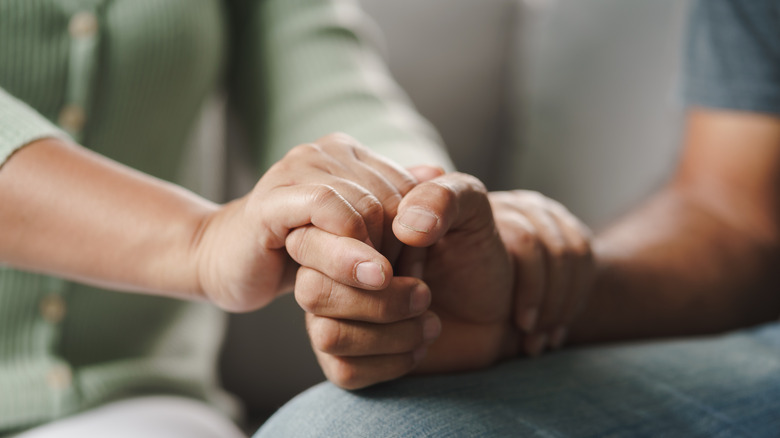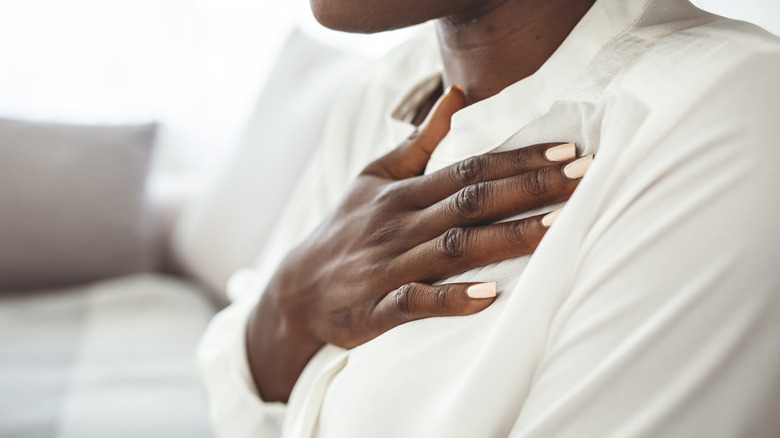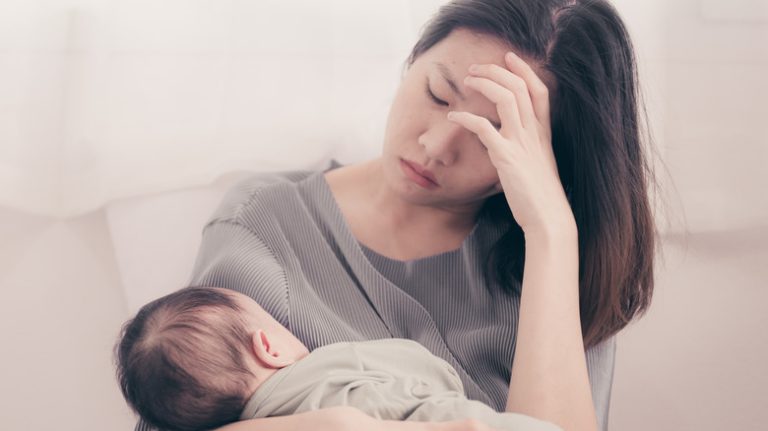If you’ve ever experienced the loss of a loved one, it can be hard to tell if the sadness you’re experiencing is a normal reaction to loss or a clinical condition. Dr. Jan E. Patterson, an integrative medicine and infectious diseases physician as well as Professor of Medicine at UT Health San Antonio Long School of Medicine, spoke to Health Digest about how to tell the difference between grief and depression — including differing symptoms, how to cope, and strategies for treatment for each.
“Grief is an inevitable part of life and occurs after the loss of a loved one, or something in life that is valued greatly — health, a job, a friendship,” said Dr. Patterson. Depression, however, is different. “Depression, referring to the medical diagnosis of major depressive disorder, affects 10% to 20% of adults and has been called the greatest contributor to disability in the world.” But the two share some of the same symptoms, making it hard to tell the difference at times. Symptoms in common can include intense sadness, tearfulness, insomnia, poor appetite, difficulty concentrating, and/or change in weight, according to Dr. Patterson.
But there are some major differences between the two. “Grief occurs after an identifiable loss, and the bereaved may feel some guilt related to some aspect of the loss,” Dr. Patterson told Health Digest. “Depression may or may not involve a loss, can be present regardless of circumstances, and guilt feelings are not related to grief.”
The different ways grief and depression show up

Dr. Patterson, who is the medical director for the Integrative Medicine Program at University Health and lead author of the book “Breath for the Soul: Self-Care Steps to Wellness,” went on to describe more differences between grief and depression. Grief, for example, includes intense sadness that can come in waves, sometimes sparked by a memory or reminder of the loss. Depression, on the other hand, is usually more continuous and shows up independent of the situation. While there’s an enormous focus on the loss in grief, depression is usually rooted in feelings of hopelessness and worthlessness that feel deep and unending.
And the way the two conditions affect your interests and pleasure is different, too. Dr. Patterson shared, “A bereaved person does not usually lose interest and pleasure in everything; in fact, their interest in the deceased is usually maintained.” But this is quite different from depression, where you often lose interest in things you used to like and feel like you can’t experience pleasure anymore. Suicidality is different in grief and depression too, since in grief you usually don’t actually want to die, despite longing to be with your loved one. “A depressed person is more likely to be withdrawn and not have the urge to see anyone,” said Dr. Patterson. “They may have thoughts of suicide.”
Does grief really have a timeframe?

Despite these differences, grief and depression aren’t always separate. Depression can follow grief or the two can co-exist, according to Dr. Patterson. If someone who experiences depression also experiences a major loss, they may need extra support in managing their depression.
While you might think that grief is linear (think Elisabeth Kubler-Ross’s five stages of grief), those who are grieving don’t necessarily move through stages. If they do, the stages aren’t always in order — and they may pop up again at any time. “While there is no timeline for grieving, typically the bereaved can return to normal life functions after around six months,” Dr. Patterson shared. “This does not mean the grief journey is over; it means that the bereaved are learning to live with their loss.” But this isn’t always the case. If you can’t return to normal life after six months, you might be experiencing complicated or prolonged grief, which is common after losing a child or experiencing the sudden or violent death of a loved one.
Those who are experiencing clinical depression have to have symptoms present for more than two weeks to receive a diagnosis, said Dr. Patterson. A physician can evaluate you and will look for symptoms such as loss of interest in activities, depressed mood, change in weight and/or sleep, frequent thoughts about death or suicide, and feelings of worthlessness. They might also look for any underlying diseases that can be associated with depression.
Grief and depression might require different kinds of treatment

Suriyawut Suriya/Shutterstock
Treatments and coping strategies for grief and depression will look different, says Dr. Patterson. “Coping with grief often involves relying on family and friends. Those with a faith tradition find these beliefs very helpful in recovery.” But if your grief continues or becomes severe, you should see a mental health professional. “A grief counselor or psychotherapist can be helpful in the early stages,” Dr. Patterson said. “If grief is prolonged or complicated, a physician can refer to a psychiatrist or psychotherapist, depending on the need.” Medical consultations can also be helpful if you need support with sleep or anxiety.
Depression on the other hand needs professional intervention, since it’s a clinical diagnosis. Dr. Patterson told Health Digest that you may need a “medical intervention with psychotherapy and/or with a psychiatrist’s evaluation for medication such as antidepressants. There is evidence that these treatments are helpful.” But social supports are still important, much like they are in grief. “A depressed person may not even be thinking clearly enough to realize that they need help, or may feel that help is futile, so family and friends can be of help here in encouraging them to get evaluated.” Treating depression is important, since depression that’s left untreated can lead to intense symptoms and even loss of life.
Taking care of yourself through sadness, no matter the cause

Dragana991/Getty Images
Those who are grieving are at greater risk of death or illness, such as heart disease, high blood pressure, and cancer, within six months after the loss, said Dr. Patterson. And depression can cause an inability to concentrate, difficulties with sleep (too little or too much), and fatigue.
Ways to take care of yourself while experiencing grief or depression can look similar, according to Dr. Patterson, whose book “Breath for the Soul” reviews the evidence for using breathwork, movement, nutrition, and spirit for coping with grief and depression as well as stress and anxiety. “Self-care strategies for grief and depression can include breathwork, involving deep and slow breathing, as well as breathing exercises that encourage relaxation,” she said. “Movement has been shown to help both conditions, whether it is vigorous or moderate exercise. Even a walk outdoors can be helpful.”
Nutrition support can be useful, since those who are grieving or depressed may have trouble preparing healthy meals for themselves. Spiritual interventions, such as praying, meditating, or talking with a spiritual leader can also be comforting to some. However, someone who is experiencing clinical depression will often need to integrate self-care strategies with medical intervention.
Learning to live with loss

PeopleImages.com – Yuri A/Shutterstock
Dr. Patterson herself is no stranger to grief. “I have had my own grief journey since the death of my son 10 years ago due to mental illness and suicide,” she shared. “I relied on my spirituality and leaned on my faith, family, and friends … The most helpful friends were the ones who just listened and did not try to give a lot of advice.”
Patterson learned a lot about self-care through her grief process. “During the early weeks and months, running and other aerobic activity was the only way to stop the rumination … about my son’s death.” She continues to use her self-care strategies, as she knows that grief doesn’t have an expiration date. “I have found that grief from this kind of loss does not really end; one learns to live with it.”
Dr. Jan E. Patterson, MD is a Professor of Medicine at UT Health San Antonio Long School of Medicine and medical director for the Integrative Medicine Program at University Health. Lead author of “Breath for the Soul: Self-Care Steps to Wellness,” Patterson believes in using all the tools in the toolbox for better health and works to integrate holistic therapies with conventional ones.
Co-author Phyllis Clark Nichols is an award-winning writer who weaves her faith and her Southern culture into her writing and speaking. A seminary graduate and a classically trained musician, Clark Nichols has also authored nine character-driven novels that explore profound human questions.



